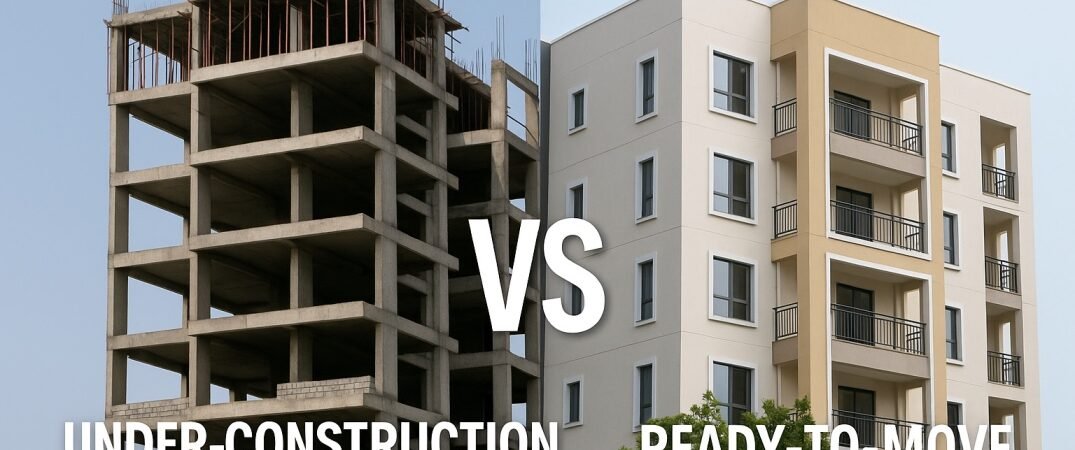Buying property in India isn’t just a financial commitment — it’s a decision that involves legal risk, documentation, and timing.
One of the biggest questions buyers ask is:
“Should I buy an under-construction property or a ready-to-move home?”
Let’s explore both options — from a legal, financial, and practical lens — and help you decide what’s best for you.
🏗️ What Is an Under-Construction Property?
An under-construction property is one that’s still being developed.
Construction may be at any stage — from digging foundations to laying final tiles.
When you choose such a property, you typically:
- Sign a Builder-Buyer Agreement
- Make payments in tranches (construction-linked plans)
- Get possession after 2–5 years
It’s often more affordable than ready homes, but the risks are higher.
Delays, deviation from approved plans, and even project abandonment are real issues.
🏡 What Is a Ready-to-Move-In Property?
A ready-to-move-in (RTM) property is complete and ready for immediate occupancy.
You can inspect it in person and move in shortly after executing the Sale Deed.
Such properties are:
- Fully constructed
- Legally cleared with an Occupancy Certificate (OC) and Completion Certificate (CC)
- Priced slightly higher, but come with less uncertainty
You also avoid construction noise, dust, and long wait periods.
🔍 Key Factors to Consider
Let’s break down both choices across key categories:
⏳ 1. Possession Timeline
- Under-Construction: Delivery may take 2–5 years or more
(depending on approvals, builder speed, and force majeure) - Ready-to-Move: Immediate possession
(ideal if you plan to move in or rent it out soon)
⚖️ 2. Legal Risk
- Under-Construction:
- Title of land may still be under scrutiny
- Builder must be RERA-registered
- Delayed OC/CC or deviation from sanctioned plan can cause trouble
- Ready-to-Move:
- Legal clarity is easier to establish
- OC, CC, and approved plans are usually in place
- You can get title verified before registration
💰 3. Cost & Taxes
- Under-Construction:
- Often 10–25% cheaper
- But attracts 5% GST (no input credit)
- Other hidden costs: amenities, development fees, escalation charges
- Ready-to-Move:
- No GST if OC is already issued
- Slightly more expensive but fewer surprises
🛠️ 4. Customization & Design
- Under-Construction:
- Option to customize layout, finishes, tiles, etc.
- Ready-to-Move:
- What you see is what you get — no design changes possible
🧾 5. Documentation Requirements
Under-construction properties require deeper legal scrutiny.
Here’s a checklist:
📌 Legal Due Diligence for Under-Construction Property
- ✅ Title Deed and ownership of the land
- ✅ RERA Registration and Builder details
- ✅ Sanctioned building plan
- ✅ Environmental Clearance (if needed)
- ✅ Builder-Buyer Agreement clauses
- ✅ Payment schedule & refund penalties
- ✅ Litigation search on builder and land
- ✅ Date of possession & force majeure clauses
📌 Legal Due Diligence for Ready-to-Move Property
- ✅ Sale Deed and title chain (minimum past 30 years)
- ✅ Occupancy Certificate (OC)
- ✅ Completion Certificate (CC)
- ✅ Encumbrance Certificate (EC)
- ✅ Property Tax Receipts
- ✅ Approved building plan & sanction
- ✅ Khata/Patta in seller’s name
- ✅ NOC from society or RWA (if applicable)
💡 When to Choose Which?
Here’s a practical guide:
✅ Choose Under-Construction Property If:
- You are looking for lower upfront cost
- You are not in a hurry to move in
- You trust the builder’s track record
- You want to customize interiors
- You are willing to bear construction risk
✅ Choose Ready-to-Move Property If:
- You want immediate possession
- You want legal safety and clarity
- You are planning to generate rental income
- You want to avoid GST charges
- You are buying through a home loan and want faster disbursement
🔎 Final Legal Thoughts
There’s no one-size-fits-all answer.
Both options are viable — but the legal risk is higher with under-construction properties.
Always involve a property lawyer before you sign anything.
Ensure a full check of:
- Title documents
- Approvals and sanctions
- Builder history and RERA compliance
- Encumbrance certificates
- OC/CC and layout match
Your home is more than four walls — it’s a legal and financial ecosystem.
📩 Call to Action
We at RJ Property Law offer pan-India legal support for property buyers, including:
- 🔍 Title verification and Encumbrance Certificate checks
- 🏢 Builder-Buyer Agreement vetting and risk analysis
- 📜 Legal opinion and stamp duty guidance
- 🏠 Full documentation support for registration, Khata/Patta, EC, and OC
Reach out to us before you buy — we’ll help you avoid costly legal mistakes.
📧 Email: ranjinijayaram@rjpropertylaw.com
📱 Phone: +91 80884 17193
🌐 Website: www.rjpropertylaw.com

